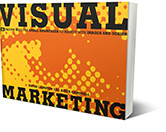Bad business decisions, greed and sloppy winner-take-all tactics are forcing us to make a change
 Friends and colleagues are out of work. The stock market seems to drop every day. And everyone wants to get back to “normal” again. But there’s no going back. A new paradigm shift is developing. Economic realities will force the hands of corporate America. Bad business decisions, greed and sloppy winner-take-all tactics are forcing us to make a change in values that will lead us to reexamine why we do business and how we communicate our products, services and values to the public. Businesses will need to develop clear, concise and meaningful communication platforms with messaging that support these new attitudes.
Friends and colleagues are out of work. The stock market seems to drop every day. And everyone wants to get back to “normal” again. But there’s no going back. A new paradigm shift is developing. Economic realities will force the hands of corporate America. Bad business decisions, greed and sloppy winner-take-all tactics are forcing us to make a change in values that will lead us to reexamine why we do business and how we communicate our products, services and values to the public. Businesses will need to develop clear, concise and meaningful communication platforms with messaging that support these new attitudes.
The surviving corporations will focus on the services and products they do best. They will acquire information through cross-functional teams, compile shared knowledge from social networking groups, and deliver their messages through multiple channels on-line, on-site and in print. Communications will be written and designed with clearly articulated missions, using the latest technology with sustainable solutions integrated into everything they do.
1. Your marketing must support your values.
This is what we are learning from the economic disaster. The old “business as usual” refrain is dead. “Businesses built on a foundation of honesty, transparency and trust will survive and thrive. That means a big swing away from corporate-sounding B2C communications and an embracing of the human voice.” Says marketing expert Craig Peters, founder of CKPcreative.
Now, that doesn’t mean that old-fashioned values are gone. As President Barrack Obama said in his inauguration address, “Our challenges may be new, the instruments with which we meet them may be new, but those values upon which our success depends, honesty and hard work, courage and fair play, tolerance and curiosity, loyalty and patriotism -- these things are old.What is demanded then is a return to these truths. What is required of us now is a new era of responsibility.”
The only company that did not experience a major loss during the Dow Jones slide was Campbell’s Soups. There’s still value and comfort in the simple pleasures of a good cup of soup. This sleepy business may be just what the doctor ordered. Stay focused on a reliable product and deliver value. Citigroup tried to deliver the supermarket of financial services, grew in leaps and bounds, but never focused on any core service. This lumbering conglomerate positioned itself with the “Citi Never Sleeps.” Meanwhile, Roger Ferguson, the president and CEO of Teachers Insurance and Annuity Association College Retirement Equities Fund (TIAA-CREF) reported on NPR’s “All Things Considered” that his company has received over $500 million more investments since December of 2008. TIAA-CREFF, the company with the Alphabet soup name, kept its focus and did not get caught up in the financial crisis. Ferguson said, “The fact that we are a sleep-easy brand has given our participants a great deal of confidence.” The “Era of Responsibility” requires us to rethink what we are doing and how we are delivering our messages.
2. Technology rules.
Social networking sites like Linked-In and Facebook are creating connections, building discussions and reshaping the way we market our services. Barriers are removed on user-generated content sites like Wikipedia where the content is updated quickly and the access uninhibited by restrictions like sign-ins or pay-for-information. New Internet access tools are echoing Facebook by offering developers the opportunity to build their own applications. A brochure-ware website where information is displayed in a static layout is no longer acceptable. You must incorporate new media into your websites. Online video and interactive modules must engage your users. Websites must be smart and easy-to-navigate, with content that supports genuine values.
3. Sustainability is key ingredient.
Are you green? There’s been a lot of green talk and now we need to see green action. Sustainability is more than just putting the recycled logo on all of your print materials. True sustainability is “the relationships between economic, social, institutional and environmental aspects of human existence.” says Eric Benson at www.renourish.com. The real green approach incorporates a perspective of thinking about your services and products from creation through delivery. As Benson says the goal is, “to maintain the same quality of life for future generations.” Companies must be constantly informed and up-to-date in green practices and their messaging needs to promote awareness of sustainability issues to the consumer and their clients
4. Your brand must be consistent yet unexpected.
Your brand or design presence should not be like the red shirt that Gilligan always wears or the zigzag outfit of Charlie Brown. They are recognizable and consistent, but boring and predictable. The outfit for your brand should always have an unexpected accessory and yet it always fits, it always feels just right. Your audience should be pleasantly delighted by a fresh perspective, yet know it is coming from a reliable and steady source. This balancing act requires a lot of attention to the details of your communication design in how you express your messaging both in the words you use and in the style, color and manner of your delivery. In the new era of values and responsibility the same old way of doing business and the same old story are no longer sufficient. Companies must create real services and products that contribute to better world and their marketing and communications programs must be re-crafted to support these efforts.
Back to Insights



